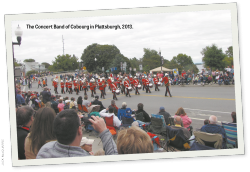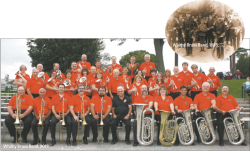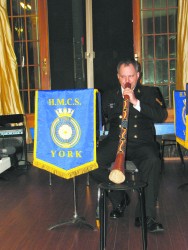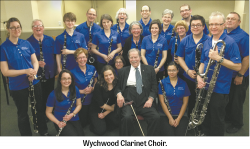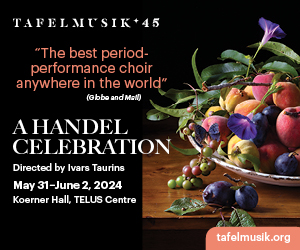Music Education No ‘Frill’
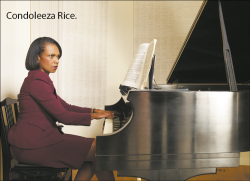 Some months ago there was quite a fuss in the news over a decision by the Toronto District School Board to do away with the itinerant music teachers, as a cost-cutting measure. These itinerant teachers normally teach only music and travel between an assigned number of schools. The effect would have been to eliminate most music education at the elementary school level. Proponents of this action expressed the opinion that music education was a frill which could readily be eliminated in a time of budget constraint. Those on the pro-music side argued that music was an integral part of our lives, and that early music education had a positive role to play in the development of many skills in later life. After considerable debate, the board arrived at a compromise, and the itinerant teachers are back in their classrooms this year. Whether this decision is merely a stay of execution or a more permanent solution remains to be seen.
Some months ago there was quite a fuss in the news over a decision by the Toronto District School Board to do away with the itinerant music teachers, as a cost-cutting measure. These itinerant teachers normally teach only music and travel between an assigned number of schools. The effect would have been to eliminate most music education at the elementary school level. Proponents of this action expressed the opinion that music education was a frill which could readily be eliminated in a time of budget constraint. Those on the pro-music side argued that music was an integral part of our lives, and that early music education had a positive role to play in the development of many skills in later life. After considerable debate, the board arrived at a compromise, and the itinerant teachers are back in their classrooms this year. Whether this decision is merely a stay of execution or a more permanent solution remains to be seen.
Personally I attended an excellent secondary school with very high academic standards, but with absolutely no formal music program. On the other hand, in my formative years I had the good fortune to have lived in a home filled with music. There were regular rehearsals in our living room and the radio always delivered symphony concerts and opera. I have lived a life filled with music. So this current debate on the merits of music education called out to me to try to get some factual information.
As luck would have it there was a recent article — “Is Music the Key to Success?” — by Joanne Lipman, which I read in the October 12, 2013 New York Times. In this article Lipman cites many prominent figures in diverse fields who were high achievers in music. Examples: Condoleezza Rice trained to be a concert pianist. Alan Greenspan, former chairman of the U.S. Federal Reserve, was a professional clarinet and saxophone player. The hedge fund billionaire Bruce Kovner is a pianist who took classes at Juilliard.
Lipman asked the question: “What is it about serious music training that seems to correlate with outsize success in other fields?” It has been generally accepted in academic circles for some time that mathematical skills are considerably enhanced by proficiency in music. Parini goes further, however, stating that the music/success correlation extends beyond the math-music connection. Many high achievers told her that music opened up many pathways to creative thinking: qualities such as collaboration, the ability to listen, ways of thinking that weave together disparate ideas, and the power to focus on the present and the future simultaneously. Advertising executive Steve Hayden credits his background as a cellist for his famous work in producing commercials for Apple computers, stating that his cello performance background helps him work collaboratively and that ensemble playing trains you, quite literally, to play well with others, to know when to solo and when to follow.
These studies got me thinking of famous musicians who also made their mark in other fields. That took me back to my days in the navy when I appeared before my Officer Selection Board. The first question that I was asked by the officer in charge of the board: “You say that one of your major interests is music.” “Yes sir.” “Name a famous composer who was also a naval officer.” My immediate reply: “Nikolai Rimsky-Korsakov.” I passed; Rimsky-Korsakov had been an officer in the Imperial Russian Navy. Then there was the famous pianist Ignacy Jan Paderewski, the first prime minister of Poland. Another Russian composer, Alexander Borodin, was a physician and professor of chemistry. Former British prime minister Edward Heath maintained an interest in orchestral music as an organist and conductor. Heath directed the London Symphony Orchestra, notably at a gala concert at the Royal Festival Hall in 1971. He also conducted the Royal Liverpool Philharmonic and the English Chamber Orchestra, as well as orchestras in Germany and the United States. He also wrote a book called The Joy of Christmas: A Collection of Carols, published in 1978 by Oxford University Press.
When I first started collecting LP records, some of my favourite recordings were by the Orchestre de la Suisse Romande under the direction of its founding director Ernest Ansermet. Originally he was a mathematics professor, teaching at the University of Lausanne, but music took over most of his life. Ansermet was one of the first in the field of classical music to take jazz seriously, and in 1919 he wrote an article praising jazz saxophonist Sidney Bechet.
Closer to home, former Canadian Governor General Ray Hnatyshyn was an accomplished bass clarinetist. Internationally renowned Canadian soprano Isabel Bayrakdarian, noted as much for her stage presence as for her musicality, just happens to have an honours degree in Biomedical Engineering.
There certainly is considerable anecdotal evidence to support the belief that proficiency in music plays a role in the development of many other cognitive skills, but the evidence goes way beyond the anecdotal. I know of at least three ongoing university research efforts closely related to this subject. One researcher at McMaster University has been investigating a broad spectrum of society to investigate the role music plays in people’s lives. Another research project at Ryerson University is examining differences in people with musical expertise when it comes to auditory versus visual selective attention. The third, at the Rotman Research Institute at Baycrest Health Sciences is the most interesting to me in terms of making a case for the value of early musical training. Stefanie Hutka, a PhD student at the Rotman Institute (and a violinist) provided this information.
“Our NeuroEducation Across the Lifespan laboratory is directly targeting an increase in awareness and accessibility of music training. On the awareness side, we are heavily involved in public outreach such as the Brain Power conference, which presents accessible information about neuroscience findings on music to scientists, educators, and parents. On the accessibility side, we have studies supporting the benefits of music, including via short-term training on software, which have been published in top scientific journals. In one 2011 study, school-aged children used music training software called Smarter Kids, developed by our lead scientist, Dr. Sylvain Moreno. After only 20 days of training, improvements on measures of verbal intelligence were observed. We are currently extending this theme of accessibility, creating software using music to train the aging brain, with very positive preliminary data.”
Her summary of the project’s findings to date?: “Everyone can benefit from music training. A wealth of empirical, neuroscientific evidence supports the positive influence of music training on numerous non-musical brain functions, such as language, reading and attention. Such benefits are seen in children, and continue across the lifespan into older adulthood. Despite this evidence, music education is still often seen as a supplemental and expensive subject in schools, and often is the target of budget cuts. Increasing awareness of the real-world benefits associated with learning music, as well as making music training more accessible, are critical steps towards supporting the inclusion of this important subject in curricula.”
As formal Liberal Leader Bob Rae (who has himself been known to lead a rousing sing-song from the piano) is reported to have stated some months ago in a debate on financing culture: “Culture is not a luxury.” Couldn’t have said it better myself!
DEFINITION DEPARTMENT
This month’s lesser known musical term is basso continuo: When musicians are still fishing long after the legal season has ended.
We invite submissions from readers. Let’s hear your daffynitions.
Jack MacQuarrie plays several brass instruments and has performed in many community ensembles. He can be contacted at bandstand@thewholenote.com.


